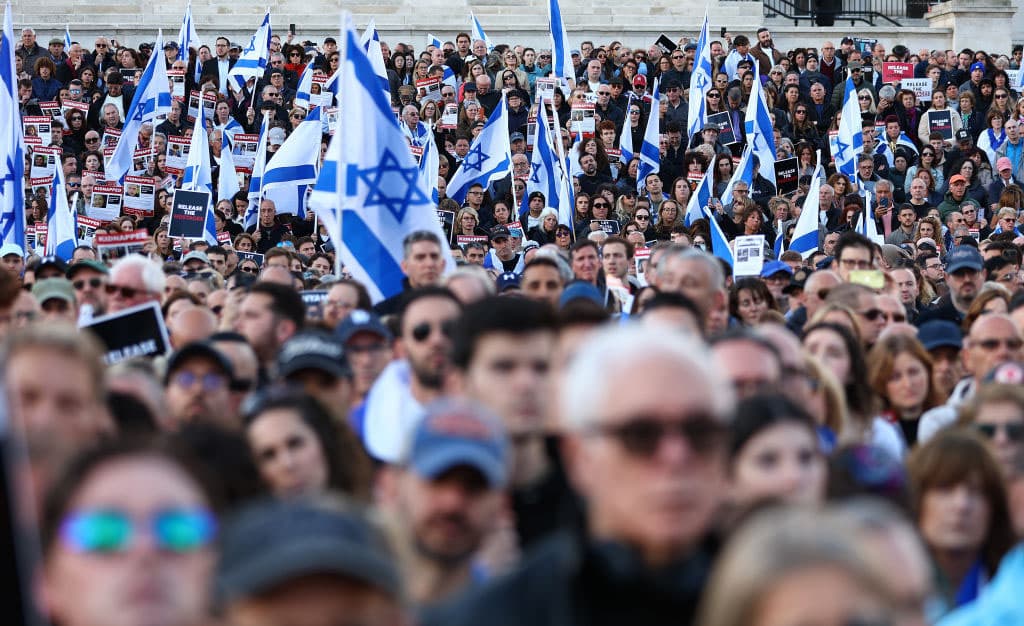 People participate in a ‘Bring Them Home’ solidarity rally in Trafalgar Square calling for the release of hostages held in Gaza by Hama on October 22, 2023. (Photo by Peter Nicholls/Getty Images)
People participate in a ‘Bring Them Home’ solidarity rally in Trafalgar Square calling for the release of hostages held in Gaza by Hama on October 22, 2023. (Photo by Peter Nicholls/Getty Images) Something noteworthy is sweeping through much of the Jewish world.
Jews have bonded over disgust.
They’re disgusted, first, by the savage murder, rape, torture, kidnapping and mutilation of more than 1400 Israelis of all ages at the hands of Hamas on October 7.
But they’re disgusted, too, by the stunning explosion of Jew-hatred around the world and on college campuses. This explosion, it must be noted, didn’t wait for Israel’s retaliation; it came immediately after the massacres.
It is this one-two punch of revulsion– for the massacres and the rise in Jew-hatred—that has ignited a level of Jewish solidarity I have rarely witnessed.
The hate we’re seeing feels so deep, so visceral, so threatening that there’s a wartime level of urgency within the Jewish community. Those marching against Jews and in support of Hamas murderers in major cities and on college campuses have shaken even the more cynical among us.
When my peace-loving college daughter hears protesters on campus yell, “We don’t want no two states, we want all of it!” she and her Jewish friends are not thinking peace—they’re thinking fear. They’re thinking the end of Israel. They’re spooked.
When my peace-loving college daughter hears protesters on campus yell, “We don’t want no two states, we want all of it!” she and her Jewish friends are not thinking peace—they’re thinking fear.
That fear is bringing them together.
The barbarians who butchered as many Jews as possible on October 7 didn’t give a hoot whether these Jews were young, old, male, female, gay, Reform, Orthodox, Haredi, Mizrachi, Ashkenazi, left, right, Likud, Labor or whatever.
For them, and for Jew-haters everywhere, every Jew is in the same boat.
“We’re all in the same boat” is precisely the electric current now coursing through Jewish veins. A global army of individual Jews and Jewish groups from across the spectrum have mobilized to help Israel any way they can, from fighting the information war on social media to raising funds for victims to organizing rallies and “bring them home” marches to taking on university leaders for not protecting Jewish students to shipping emergency supplies to Israel.
No one is worried about Jewish labels. The urgency of the moment is too great.
Critics who glibly call for a “ceasefire” misunderstand what Israelis are going through. Israel has survived for 75 years in a supremely hostile region because its sworn enemies were intimidated by Israel’s might. Wonks call it deterrence; we can also call it strategic fear.
In a Mideast jungle where the common language is force, if Israel’s enemies are no longer afraid of the Israel Defense Forces, that’s big news. The word gets out.
Oct. 7 did much to erode the fear of Israel, and the word got out.
Suddenly, the strongest army in the Middle East was humiliated. It couldn’t defend its own people against a gang of terrorists. For once it looked weak and vulnerable. The enemy smelled blood.
Israel’s harsh response in Gaza is not about vengeance. It’s about survival. It’s about regaining deterrence. Israelis know that if they can’t put fear back into their enemy’s hearts, their existence is in play. That’s why Israelis from the left and right have supported aggressive action against Hamas. It is a statement to all hostile forces in the region: We’re still that Israel you better not mess with.
Israel’s harsh response in Gaza is not about vengeance. It’s about survival. It’s about regaining deterrence.
In such a life or death situation, it’s hard for Israelis to take calls for a “ceasefire” seriously.
This existential anxiety has also touched and united the Jews of the Diaspora. We’re seeing the faces of the haters, ripping down posters of hostages and brazenly calling for the end of the Jewish state. We’re seeing the triumphant body language. We’re seeing how these haters and Hamas supporters also smell blood.
It’s not only disgust, then, that is uniting Diaspora Jewry—it’s also an existential dread. It’s a realization that the weakness Israel showed on October 7 has triggered a dangerous, long-dormant dream among our enemies that “maybe now we can finish them off.”
If this kind of shared menace doesn’t unite Jews, nothing will.
In all the darkness, though, there is an upside to this unity– it is the rekindling of Jewish peoplehood.
Jewish identity has always been multi-faceted. Judaism is a religion, a culture, a nation, a civilization, a people. By bringing Jews of all backgrounds together, the existential crisis coming out of October 7 has reminded us that we are, above all, a people.
Yes, we seem to always wait for danger to unite us. But so what? We’re only human. This is how humans react.
Perhaps because of the unprecedented horrors of October 7, the solidarity this time may be more sticky. We can only hope that our renewed sense of peoplehood will outlast this most painful of moments in our modern history. It would certainly make us stronger and less vulnerable.
If our enemies treat us as one, who are we to disagree?























 More news and opinions than at a Shabbat dinner, right in your inbox.
More news and opinions than at a Shabbat dinner, right in your inbox.